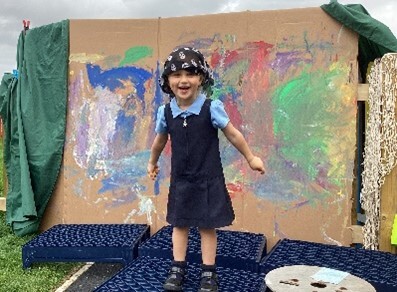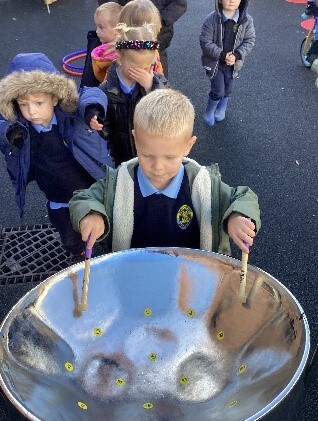Music
Music at Buntingford First School aim is to produce the musicians of the future, those who will continue to enjoy performing and enjoying music into their adult lives. All students, regardless of ability, will achieve their musical potential, gain an understanding of a huge range of musical styles, gain the skills required to create and play on a range of instruments, and build on developing their key attributes that learning music supports.
We aim to provide an exciting musical curriculum. We believe that Music is a universal language that embodies one of the highest forms of creativity. We aim to engage and inspire pupils to develop a love of music and their talent as musicians, and so increase their self-confidence, creativity and sense of achievement. The children are taught to develop a critical engagement with music.
Why is Music important?
Through music, we are provided with a powerful universal language which helps promote unity, enables us to process and express our emotions and fuels our imagination.
Music is important in developing individual discipline, focus and memory.
Whether the we are singing, playing, or listening, we develop our aural discrimination through music, which is an important part of communication and literacy.

When is Music taught?
Music is taught through thematic units, both through Skills Development Tasks and through learning which then apply those skills. The Satellite View maps out which thematic units feature this subject and clearly shows the objectives taught.
How is Music taught?
Music is taught through a combination of subject knowledge and composing, performing, listening and appraising skills. Learning takes place both inside and outside the classroom.
Who do we learn about in Music?
We learn about a range of famous composers from history, such as J.S. Bach, Ludwig Van Beethoven and Rimsky-Korsakov.
We also learn about more contemporary composers, such as Andrew Lloyd-Webber.
What do we learn about in Music?
We learn about the following:-
Notation
Graphic scores
Signs and symbols
Soundscapes
Sound effects
Singing
Sea shanties
Folk songs
Battle chants
War songs
Instrument families
Evolution of instruments
African music, including drumming
Celtic music
Hannukah music
Jingles
Film music
Musicals
Inuit throat singing

How do we assess and monitor Music?
Assessment in music throws up unique challenges. In most other subjects, progress is measured by tasks getting harder, but in music it is possible to make progress by getting ‘better’ at simple tasks. It is not always necessary to make the tasks harder, and in fact, it is almost always better to perform or compose a simple piece well than it is to perform or compose a complex piece badly! Pupils can be amazing performers but not so great at composing, or astute listeners who suffer from crippling anxiety when asked to sing or play.
Music is made up of many different types of skills. We assess the skills of listening, performing, composing and improvising alongside knowledge and understanding of musical terminology.
Teachers collect videos and/or audio files that can be compared to show progress over time.
What does inclusion look like for children with SEND in Music?
This table includes some of the strategies which may be used as reasonable adjustments to support children with SEND in this subject area.
|
Communication and Interaction |
Cognition and Learning |
|
• a range of alternative ways to record understanding, e.g. verbally, pictorially, digitally • visuals and multi-media to support pupils’ understanding • scaffolded talks to reduce cognitive load • pre-teach specific vocabulary • Social stories- sensory audit of environment.
|
• a range of alternative ways to record understanding, e.g. verbally, pictorially, digitally • visuals and multi-media to support pupils’ understanding • scaffolded talks to reduce cognitive load • different formatting to reduce cognitive load and processing instructions • support with co-ordination of specific instruments • word banks with visuals where appropriate • writing and speaking frames • explicit teaching, modelling and oral rehearsal of new subject-specific vocabulary • pre-teaching of new vocabulary |
|
Social, emotional and mental health difficulties |
Sensory/ or physical needs |
|
• scaffolded talks to reduce cognitive load • different formatting to reduce cognitive load and processing instructions • chunked instructions • use as a therapeutic tool |
• adapting resources where needed to ensure all pupils can access the materials • consideration of sensory needs – ear defenders |


